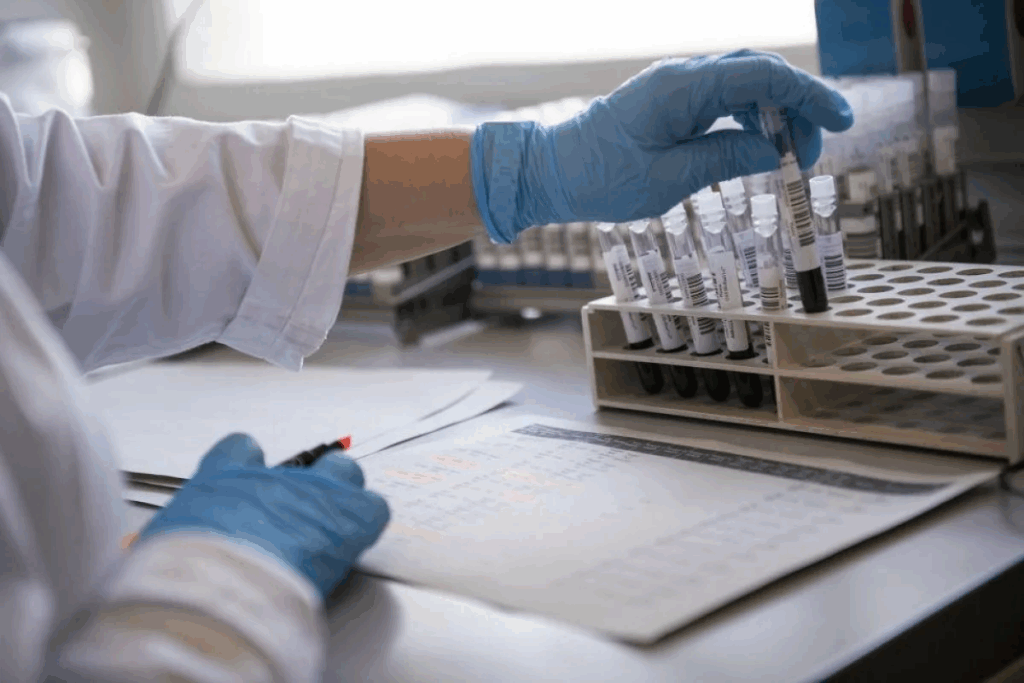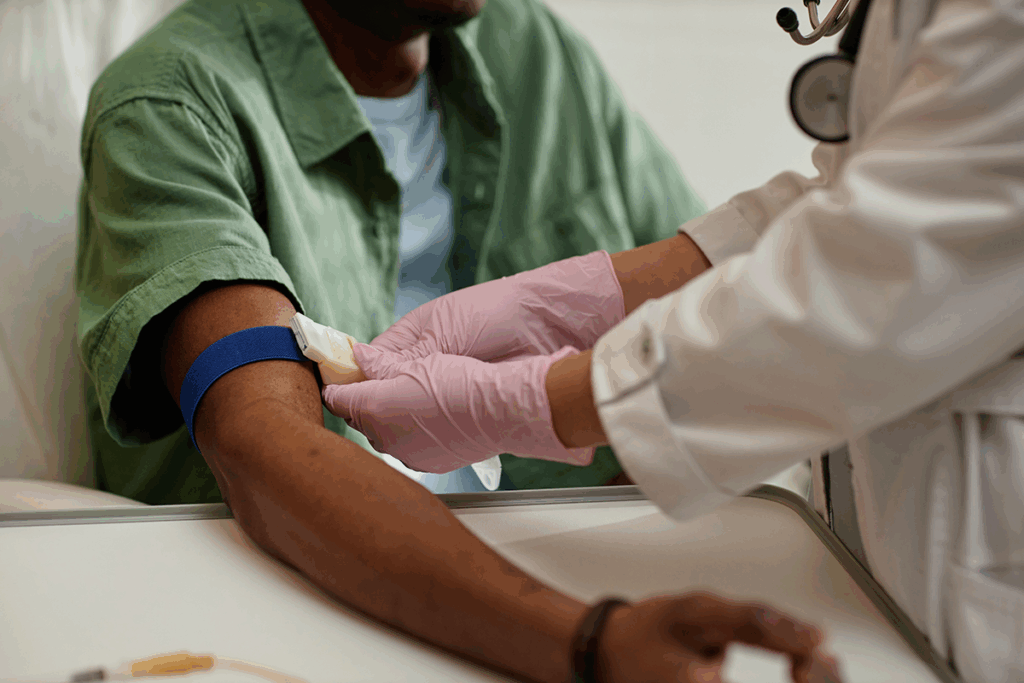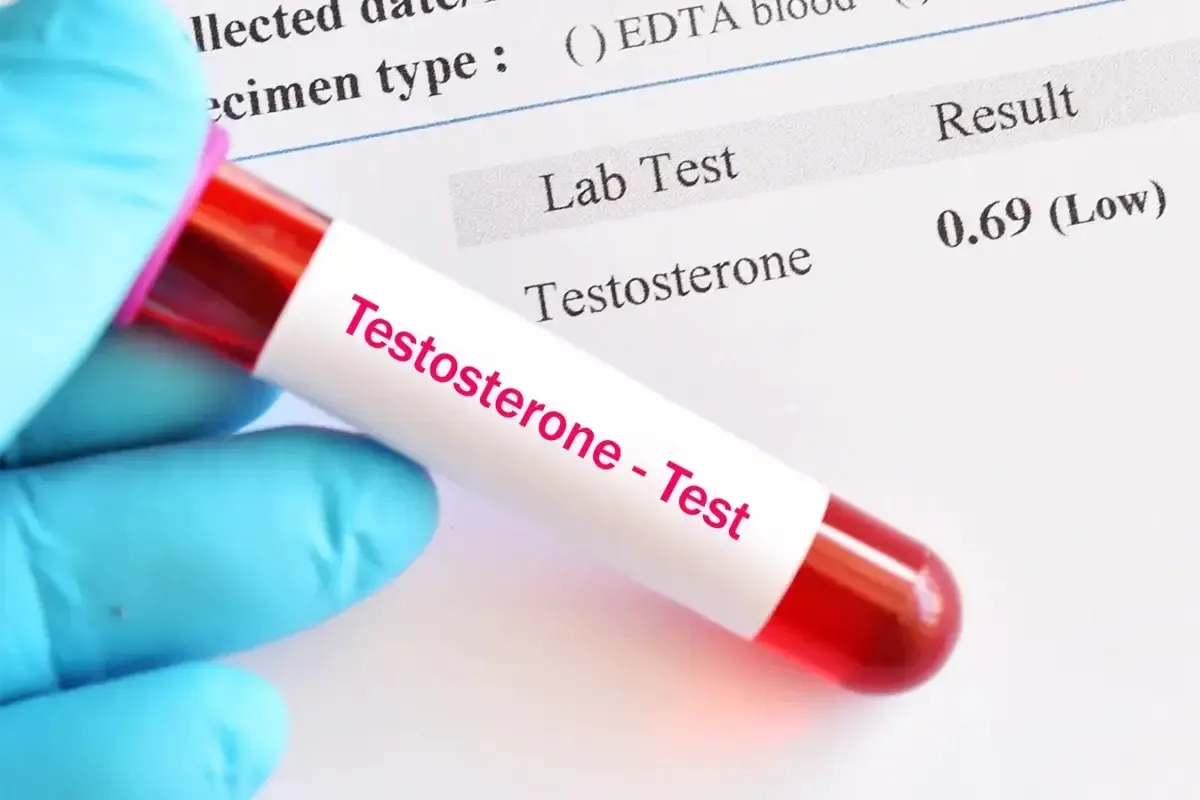
Recent advances in medical diagnostics have introduced important options for colorectal cancer detection. In July 2024, the FDA approved Shield, a groundbreaking cell-free DNA blood test. It detects 83 percent of colorectal cancers with 90 percent specificity.Wondering “can blood test detect colon cancer?” This guide gives the surprising facts about new tests, CEA markers, and routine blood work.
This advancement is exciting in cancer diagnostics. But, it’s important to know what blood tests can and cannot do. The Shield blood test is a new option for colorectal cancer screening. It’s non-invasive.

Key Takeaways
- The FDA approved Shield, a cell-free DNA blood test, for colorectal cancer screening in July 2024.
- Shield detects 83 percent of colorectal cancers with 90 percent specificity.
- The test is non-invasive and can be completed at any commercial laboratory.
- Blood-based tests are not diagnostic replacements for colonoscopy.
- Understanding the limitations of current blood tests is key for informed healthcare decisions.
Understanding Colorectal Cancer and Screening Importance
Colorectal cancer is becoming more common in America. Early detection is key. It’s important to know how to screen for it.
The Rising Incidence of Colorectal Cancer in America
Colorectal cancer is a top cancer in the U.S. It’s rising, even among the young. We need to be more aware and screen more.
Early detection is vital. If caught early, the survival rate is about 90%. But, over a third of adults are not screened, showing a big gap in care.
Why Early Detection Matters
Finding colorectal cancer early is key for better treatment and survival. Screening can catch it before symptoms show. It can also stop cancer by removing polyps.
Screening is our strongest weapon against colorectal cancer. Knowing about screening options helps people take care of their health.
We suggest talking to your doctor about when to get screened. This depends on your risk and health history. Together, we can lower colorectal cancer rates.
Traditional Colorectal Cancer Screening Methods
Traditional screening methods for colorectal cancer have been key in early detection and prevention. These methods have changed over time. They include various tests to find and prevent colorectal cancer.
Colonoscopy: The Gold Standard
Colonoscopy is seen as the top choice for colorectal cancer screening. It checks the colon and rectum with a flexible tube and camera. This lets doctors find and remove polyps that could become cancer during one visit.
Benefits of Colonoscopy:
- Direct visualization of the colon and rectum
- Ability to remove precancerous polyps
- High sensitivity for detecting cancer and polyps
But, colonoscopy has its downsides. It’s an invasive test that needs bowel prep and sedation. Some find it uncomfortable. There’s also a small chance of bleeding or perforation.
Stool-Based Tests
Stool-based tests are non-invasive options. They look for hidden blood or DNA changes in stool, signs of colorectal cancer. These tests are simpler and can be done at home.
Types of Stool-Based Tests:
Test Type | Description | Frequency |
Fecal Occult Blood Test (FOBT) | Detects hidden blood in the stool | Annually |
Fecal Immunochemical Test (FIT) | Detects antibodies to human hemoglobin in the stool | Annually |
Stool DNA Test | Detects DNA changes and blood in the stool | Every 3 years |
Stool-based tests are less invasive but less sensitive than colonoscopy. They might need more tests if they find something.
Imaging Tests
Imaging tests, like CT colonography, use X-rays to see the colon and rectum. They can spot big polyps and cancers but might miss small ones.
“CT colonography has emerged as a valuable tool for colorectal cancer screening, particular for patients who cannot or prefer not to undergo colonoscopy.” – American Cancer Society
Imaging tests are good for those who can’t or don’t want colonoscopy. But, they might not catch all polyps, and there’s radiation risk.
In summary, each traditional screening method has its own benefits and drawbacks. Knowing these helps patients and doctors pick the best screening plan.

Can Blood Tests Detect Colon Cancer? The Science Explained
Scientists are working on a way to find colon cancer without invasive tests. They’ve created blood tests that look for specific markers in the blood. These markers might show if someone has colon cancer.
How Blood-Based Tests Work
Blood tests for colon cancer check for DNA and other signs of cancer in the blood. Circulating tumor DNA is DNA from cancer cells that gets into the blood. By finding certain genetic changes, these tests might spot cancer early.
“Blood tests for cancer are a big step forward,” says Medical Expert, a top oncologist. “They’re a gentler way to screen for cancer. This could make it easier for people to get checked and get better sooner.”
Circulating Tumor DNA (ctDNA)
Circulating tumor DNA is key for finding colon cancer. When cancer cells die, they spill their DNA into the blood. ctDNA analysis looks for specific genetic changes linked to colon cancer. This helps find cancer early and treat it sooner.
Cancer Markers in the Bloodstream
Other signs of cancer can also be found in the blood. These include proteins and molecules made by cancer cells or in response to cancer. Blood tests can find these markers. This gives clues about whether someone has colon cancer and how advanced it might be.
As research gets better, blood tests for colon cancer will likely play a bigger role. They’re becoming more accurate and could be a key tool in the fight against colon cancer.
The Shield Blood Test: A 2024 Breakthrough in Screening
The FDA approved the Shield blood test in July 2024. This is a big step forward in finding colorectal cancer early. It could change how we treat this disease.
FDA Approval and Clinical Significance
The Shield blood test got FDA approval for its strong performance. It finds 83% of colorectal cancers with 90% accuracy. This makes it a great tool in the fight against cancer.
This test finds cancer DNA in the blood. It’s a less scary way to screen for cancer than old methods.
This test is key in doctor’s offices. It gives patients a comfy screening option without losing accuracy.
Detection Rates and Specificity
The Shield blood test is very good at finding colorectal cancer. It spots 83% of cases. It also correctly says 90 out of 100 people without cancer are healthy.
Test Characteristics | Percentage |
Detection Rate for Colorectal Cancer | 83% |
Specificity | 90% |
Limitations in Detecting Precancerous Polyps
The Shield blood test is great at finding cancer but not so good at finding polyps that might turn into cancer. It only finds 13% of precancerous polyps. This shows we need to keep looking and maybe use other tests too.
We must remember the Shield blood test is just one part of finding cancer. It’s part of a bigger plan that might include other tests.
Blood Work Indicators and Colorectal Cancer Labs
It’s important to know how blood tests can help find colon cancer early. These tests can show if a person has colon cancer by looking for certain signs.
Complete Blood Count Abnormalities in Colon Cancer
A Complete Blood Count (CBC) test checks the blood for different parts. In colon cancer, a CBC might show:
- Anemia from losing blood in the tumor
- More white blood cells because of inflammation or infection
- More platelets, which can happen in many cancers, including colon cancer
These signs can lead doctors to look closer and possibly find colon cancer.
Carcinoembryonic Antigen (CEA) Testing
Carcinoembryonic Antigen (CEA) is a protein found in some cancers, like colon cancer. It’s not a sure sign of cancer, but high levels can mean cancer is there. Doctors use it to see how well treatment is working and if cancer comes back.
Key aspects of CEA testing include:
- Checking CEA levels before and after surgery to see if treatment worked
- Testing CEA regularly to catch cancer coming back early
- Knowing that high CEA levels can also mean other things, not just colon cancer
Other Blood Markers for Colorectal Cancer
While CEA is well-known, scientists are looking at other blood markers too. These could help find and track colon cancer better. Some of these markers are:
- Genetic changes linked to colon cancer
- Proteins and molecules that change when cancer is present
- Markers of inflammation that might show a tumor
These new markers could help find colon cancer sooner and treat it better.
Comparing Diagnostic Methods: Blood Tests vs. Colonoscopy
Two main methods are used for colon cancer screening: blood tests and colonoscopy. Each has its own benefits and drawbacks. Knowing these differences helps you make better health choices.
Accuracy and Detection Capabilities
Colonoscopy is the top choice for colon cancer screening. It lets doctors see the whole colon and find polyps, which can be removed. Blood tests, though, look for biomarkers or genetic material in the blood linked to colon cancer.
Key differences in accuracy and detection capabilities include:
- Colonoscopy can spot precancerous polyps and cancerous lesions accurately.
- Blood tests are less invasive but might miss some colon cancers, mainly in early stages.
- The sensitivity of blood tests varies, catching many colon cancers but often missing polyps.
The Critical Advantage of Polyp Removal
Colonoscopy’s big plus is removing precancerous polyps during screening. This early detection and removal can stop cancer from forming.
Removing polyps during colonoscopy lowers colon cancer rates. Blood tests can show cancer or high-risk conditions but can’t remove polyps.
When Each Test Is Most Appropriate
Choosing between blood tests and colonoscopy depends on several factors. These include patient preference, risk factors, and medical history.
Considerations for choosing between blood tests and colonoscopy:
- People at average risk might start with a blood test as a first step.
- Those at higher risk or with a positive blood test result might need a colonoscopy next.
- Colonoscopy is often advised for those with a family history of colon cancer or other risk factors.
Choosing the right test should be a decision made with a healthcare provider. They will consider your specific situation and the latest guidelines.
Imaging Options: Will Colon Cancer Show on CT Scan?
Imaging tests, like CT scans, play a big role in finding colon cancer. It’s key to know what they can and can’t do.
CT Scan Capabilities for Colorectal Cancer Detection
CT scans are great for spotting colon cancer, mainly in later stages. They show the colon and nearby tissues clearly. This helps find tumors and other issues. CT colonography is a special CT scan for the colon and rectum. It finds big polyps and tumors that might be cancer.
CT scans are also good at finding cancer in other parts of the body. This helps doctors know how far the cancer has spread. It helps decide the best treatment plan.
Limitations of Imaging for Early-Stage Detection
But, CT scans aren’t perfect, mainly for catching early colon cancer. Small polyps or early tumors might not show up. This can lead to false negatives. Also, CT scans can’t always tell if a lesion is cancerous without more tests.
Another thing to think about is the radiation from CT scans. This is a concern, as patients might need more than one scan.
Combining Blood Tests with Imaging for Better Results
Using blood tests with CT scans can make diagnosis better. Blood tests look for markers like ctDNA. Together, they give a clearer picture of the disease.
Diagnostic Method | Strengths | Limitations |
CT Scan | Detailed images of colon and surrounding tissues; detects larger polyps and tumors. | Limited in detecting small polyps or early-stage cancer; involves radiation exposure. |
Blood Tests | Detects specific markers like ctDNA; non-invasive. | May not detect all cases of colon cancer; requires further testing for confirmation. |
Combined Approach | Enhances diagnostic accuracy; provides a full disease assessment. | May increase diagnostic costs; needs careful result interpretation. |
Knowing the good and bad of CT scans and blood tests helps doctors find colon cancer better. This mix can lead to better patient care by catching cancer early and treating it right.
Screening Recommendations by Age, Gender, and Risk Factors
Colon cancer screening advice changes with age, gender, and risk. Knowing these guidelines helps doctors and patients make smart choices.
Guidelines for Average-Risk Individuals
People at average risk should start screening at 45. The American Cancer Society suggests screening until 75. The right test depends on personal history and preferences.
- Between 45 and 75, you can choose colonoscopy every 10 years or FIT every year.
- For those 76 to 85, screening depends on health and life expectancy.
How to Test for Colon Cancer in Women
Women’s screening guidelines are similar to men’s. The age and frequency depend on risk. Talk to your doctor about your risk to find the best screening plan.
Key considerations for women include:
- Family history of colon cancer or polyps.
- Personal history of other cancers or inflammatory bowel disease.
- Genetic syndromes that increase colon cancer risk.
Special Considerations for High-Risk Groups
Those at higher risk, like those with family history or genetic syndromes, may need earlier and more frequent tests.
For high-risk individuals:
- Screening can start as early as 20 or 10 years before the first colon cancer in the family.
- Genetic counseling and testing might be suggested to find specific risk mutations.
It’s clear that a tailored approach to colon cancer screening is key. We must consider each patient’s unique risk and preferences for the best care.
Conclusion: Navigating Your Colorectal Cancer Screening Options
There are many ways to screen for colorectal cancer, each with its own pros and cons. We can pick from colonoscopy, blood tests, and imaging tests. The choice depends on our risk and what we prefer.
Finding the right colon cancer screening can be tricky. But knowing our options is key to catching cancer early. Blood tests, like the Shield Blood Test, are a good choice for those who can’t or don’t want a colonoscopy.
When looking at screening options, we need to think about how accurate each test is. Colonoscopy is the top choice, but blood tests and imaging can also help. They work best when used together.
In the end, talking to our doctor is the most important step. They can help us choose the best screening based on our health and risk. This way, we can stay healthy and keep our well-being in check.
FAQ:
Can blood tests detect colon cancer?
Blood tests, like the Shield blood test, can spot some markers linked to colon cancer. But they’re not as good at finding polyps that might turn into cancer. We’re looking into how well these tests work for finding colon cancer.
How accurate are blood tests in detecting colon cancer?
The Shield blood test can find colorectal cancer 83% of the time. But it’s not great at finding polyps that could become cancer, with a 13% success rate.
What are the traditional screening methods for colorectal cancer?
Old-school methods include colonoscopy, stool tests, and imaging. Colonoscopy is top-notch because it can find and remove polyps before they become cancer.
Can CT scans detect colon cancer?
CT scans can spot colon cancer, but they’re better at finding it when it’s more advanced. They’re not as good at catching it early or finding polyps.
What blood work indicators are used in colorectal cancer diagnosis?
Doctors use Complete Blood Count (CBC) tests, Carcinoembryonic Antigen (CEA) tests, and other markers to help diagnose colorectal cancer.
How does the Shield blood test compare to colonoscopy?
The Shield blood test is easier to do, but colonoscopy is better because it can remove polyps. Blood tests might be better for some people, but colonoscopy is more accurate.
Who should be screened for colon cancer?
People without a high risk should start screening at 45. Those with a family history of colon cancer might need to start earlier.
Are there different screening recommendations for women?
Women without a high risk should start screening at 45, just like men. But, their individual risk factors might change what’s recommended.
Can colon cancer be detected with a blood test?
Blood tests can find some markers for colon cancer, but they can’t replace colonoscopy for finding cancer or polyps.
Will colon cancer show up on a CT scan?
Yes, CT scans can show colon cancer, but only when it’s more advanced. They’re not good at finding it early or polyps.
What are the benefits of combining blood tests with imaging?
Using blood tests with imaging, like CT scans, can give a clearer picture of a person’s health. It helps doctors understand more about what’s going on.
Reference
National Center for Biotechnology Information. Evidence-Based Medical Guidance. Retrieved from https://pubmed.ncbi.nlm.nih.gov/27533362/








